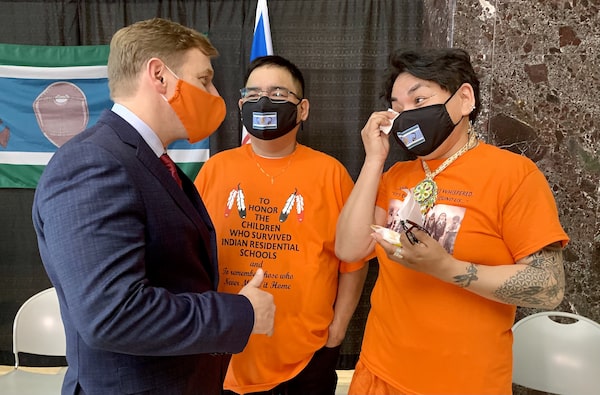
Newfoundland and Labrador Premier Andrew Furey speaks with deputy grand chief Mary Ann Nui, right, and Grand Chief Etienne Rich, both of Labrador's Innu Nation, in St. John's, on June 10, 2021. A long-awaited inquiry into the treatment of Innu youth in provincial care has begun in Sheshatshiu, N.L., one of two Innu communities in Labrador.Sarah Smellie/The Canadian Press
There was a sense of relief among Innu families Monday as the long-awaited inquiry into the treatment of Innu children in care finally got under way in Sheshatshiu in central Labrador after years of delay, said commissioner James Igloliorte.
“There have been some real problems from the time that they settled down in communities in the 1960s, to the present day where loss of culture, a loss of language, loss of a way of life has resulted in families being severely impacted to a degree that the Innu themselves have started reflecting on healing,” said Mr. Igloliorte, a retired provincial court judge from Hopedale, Nfld.
“One of the ways they would like to start this healing process and continue the healing process for families is to examine the impacts that the child protection system has had on them.”
Nearly six years after it was announced, the Inquiry into the Treatment, Experiences and Outcomes of Innu in the Child Protection System begins with a review of the history of child protection of Innu, and will examine gaps in access to services, connection to culture and community while youth were in custody, and how Innu were treated in the system.
The inquiry, which is not intended to lay blame, will investigate five cases of youths who died while in care or who had been in the provincial child protection system.
National First Nations group applauds Labrador Innu groups’ human rights complaint
Simeon Tshakapesh, a former deputy grand chief of the Innu Nation, led the fight for an inquiry after the death of his son in the spring of 2017, calling for an end to children and youth being removed from their communities. As one of Labrador’s most outspoken Indigenous leaders, he has pleaded for help to deal with solvent abuse, or gas sniffing among children, in Labrador for three decades.
His son, Thunderheart, 16, took his own life after two years of treatment for solvent abuse – much of it far outside his home community of Natuashish. Two of Mr. Tshakapesh’s family members followed the same path.
In 1993, Mr. Tshakapesh released to the media a widely publicized video of six adolescents in Davis Inlet inhaling gasoline in a shed and yelling that they wanted to die. The images of youth getting high on gasoline in plastic bags and rundown housing without running water made international headlines.
Almost a decade later, the federal government helped relocate the people of Davis Inlet about 15 kilometres away to new homes in Natuashish. It was supposed to be a fresh start but the problem of solvent abuse persisted. The remote community accessible by boat or plane is home to about 1,300.
In the spring of 2017, two boys suffered serious burns when a house, a known hangout for gas-sniffing, burned to the ground in Natuashish. It was the third fire in a month. At the time, Mr. Tshakapesh said solvent abuse among youth had become “an epidemic,” and he lamented the lack of support to address it.
Innu Nation Grand Chief Etienne Rich has said the communities of Sheshatshiu and Natuashish have awaited answers for a long time. “We hope that the inquiry will help us better understand where the system has failed Innu and how we can work together to make the right changes for better outcomes for our children,” he said.
The Innu are the Indigenous people of Nitassinan, or Our Land, comprised of much of Labrador and some parts of Eastern Quebec. The Innu Nation, the governing body for the Innu people in Labrador, initiated the inquiry as a step toward governing its own child protection services. It will hear from the people of Sheshatshiu and Mushuau First Nations in northern Labrador near Natuashish, before examining what new child protection legislation would look like, and what support and funding would be needed.
Anastasia Qupee, a former grand chief of the Innu Nation, and Mike Devine a retired professor of social work, were also appointed commissioners.
The commissioners will write a final report with recommendations due at the end of October, but are seeking an extension from the province.
With a report from The Canadian Press